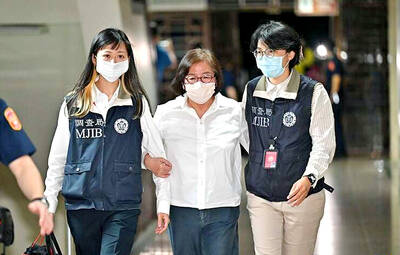The Control Yuan criticized the quality of the equipment used by the army’s armored units, saying aging tanks have fallen more than a generation behind modern standards.
The Control Yuan, at the request of two members, Kao Feng-hsien (高鳳仙) and Teresa Yin (尹祚芊), opened an investigation into an incident in Pingtung County last month when a CM-11 tank toppled into a creek, killing four crew members and injuring the driver.
The Control Yuan said it needed to open the investigation because the frequency of accidents involving armored units has sapped military morale and undermined public confidence in the armed forces, citing the Pingtung accident as well as one in November last year, when an out-of-control CM-21 armored personnel carrier fell into a lake, killing two soldiers.
A separate investigation into the military’s purchase of tracks for tanks and other armored vehicles concluded in May that “structural, institutional and systemic malfeasance” persist in contracting and testing equipment purchases, the Control Yuan said.
The Control Yuan said that it had filed a corrective measure against the Ministry of National Defense over that case.
It said that it recommended the ministry discipline personnel responsible for the scandal, including officers serving at Army Command Headquarters.
The military’s program to obtain next-generation tanks would be a high-priority item in the annual audit of the ministry in November, the Control Yuan said.
The M60A3 tanks, one of the army’s two main battle models, were retired by the US army following the 1991 Gulf War and purchased by Taiwan in 1995, so they have been in service for more than 30 years, the Control Yuan said.
The CM-11 tanks were assembled by combining the hulls of M60-series tanks with the turrets of M48-series tanks and a modern fire-control system, the Control Yuan said, adding that the tanks began service with Taiwan’s military in 1990.
The Control Yuan said it expects the ministry to report on its plans to modernize the army’s tank fleet and on the progress it has made in implementing them.

Costa Rica sent a group of intelligence officials to Taiwan for a short-term training program, the first time the Central American country has done so since the countries ended official diplomatic relations in 2007, a Costa Rican media outlet reported last week. Five officials from the Costa Rican Directorate of Intelligence and Security last month spent 23 days in Taipei undergoing a series of training sessions focused on national security, La Nacion reported on Friday, quoting unnamed sources. The Costa Rican government has not confirmed the report. The Chinese embassy in Costa Rica protested the news, saying in a statement issued the same

Taiwan is to extend its visa-waiver program for Philippine passport holders for another year, starting on Aug. 1, Minister of Foreign Affairs Lin Chia-lung (林佳龍) said on Friday. Lin made the announcement during a reception in Taipei marking the 127th anniversary of Philippine independence and the 50th anniversary of the establishment of the Manila Economic and Cultural Office (MECO) in Taiwan, the Ministry of Foreign Affairs said. The decision reflected Taiwan’s commitment to deepening exchanges with the Philippines, the statement cited Lin as saying, adding that it was a key partner under the New Southbound Policy launched in 2016. Lin also expressed hope

Temperatures in New Taipei City’s Sindian District (新店) climbed past 37°C yesterday, as the Central Weather Administration (CWA) issued heat alerts for 16 municipalities, warning the public of intense heat expected across Taiwan. The hottest location in Taiwan was in Sindian, where the mercury reached 37.5°C at about 2pm, according to CWA data. Taipei’s Shilin District (士林) recorded a temperature of 37.4°C at noon, Taitung County’s Jinfeng Township (金峰) at 12:50 pm logged a temperature of 37.4°C and Miaoli County’s Toufen Township (頭份) reached 36.7°C at 11:40am, the CWA said. The weather agency yesterday issued a yellow level information notice for Taipei, New

CASE: Prosecutors have requested heavy sentences, citing a lack of remorse and the defendants’ role in ‘undermining the country’s democratic foundations’ Five people affiliated with the Chinese Nationalist Party (KMT), including senior staff from the party’s Taipei branch, were indicted yesterday for allegedly forging thousands of signatures to recall two Democratic Progressive Party (DPP) lawmakers. Those indicted include KMT Taipei chapter director Huang Lu Chin-ru (黃呂錦茹), secretary-general Chu Wen-ching (初文卿) and secretary Yao Fu-wen (姚富文), the Taipei District Prosecutors’ Office said in a news release. Prosecutors said the three were responsible for fabricating 5,211 signature forms — 2,537 related to the recall of DPP Legislator Wu Pei-yi (吳沛憶) and 2,674 for DPP Legislator Rosalia Wu (吳思瑤) — with forged entries accounting for